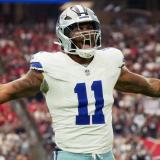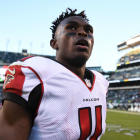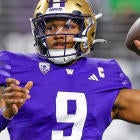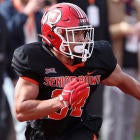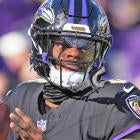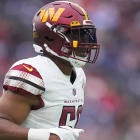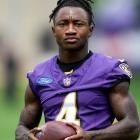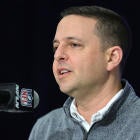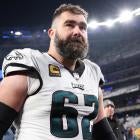If the Atlanta Falcons win one more game this season, the lingering debate about their bold acquisition of Julio Jones in the 2011 draft will be put to rest. The move was made with a Lombardi Trophy in mind -- mortgaging the upper rounds of two drafts for one player implies as much. Should the Falcons take home their first title Feb. 5, or at any point during Jones' career, then this matter will have been settled.
And given the prolific talent Jones quickly proved to be and his import to the franchise (he certainly is one of the Falcons' three most integral players), some would posit that the rich bounty of picks Atlanta dealt for him already has borne sufficient fruit. Others might turn to consecutive recent seasons of four, six, then eight wins and say that trade easily could have cost many in that front office their jobs, and was more risky than necessary.
What's not up for discussion is that Jones is on a historic pace in some regards -- certainly in terms of receptions and yards per game -- and statistically measures up with some of the all-time best receivers. Of course, we are also in the most pass-happy era in football history, and as great as Jones is, some of his numbers pale when compared to cohorts like Antonio Brown and Odell Beckham.
We'll never know what the Falcons would have done with the five draft picks they sent Cleveland as part of the leap from No. 27 to No. 6 overall in the 2011 draft to select Jones. But I wondered what other executives thought of those moves now, with Jones about to play the biggest game of his life. And after he has already dominated this postseason on top of helping Atlanta pull out of a three-year malaise (18-30 from 2013-15) following its NFC Championship Game appearance in 2012, Jones' second season.
We tend to forget how surprising the return on this investment was, in real time, with Jones himself saying on draft day he was "very shocked" at what Atlanta general manager Thomas Dimitroff gave up to land him.
"It took me by surprise," Jones said at the time. "I feel like they have a lot of trust in me. I'm not going to disappoint."
This swap was to be a boon for Cleveland. Alas, the Browns wasted those selections as they have so many picks over the years. It was also a very real risk for Falcons management, with owner Arthur Blank's loyalty to Dimitroff and his staff ultimately rewarded with the franchise's second Super Bowl appearance.
Jones clearly has kept up his end of the bargain. He is the first player in history to average more than 100 receiving yards per game over four straight seasons. He can, and does, absolutely take games over, and he has brought out the best in quarterback Matt Ryan, an MVP favorite in 2016.
Here's how Jones compares to Jerry Rice in their first six seasons (with the caveat being the rules have changed exponentially to favor the passing game and Rice would have been even more unstoppable in this era):
| Player | Years | Gm | Rec | Yds | TD | Yds/rec | Yds/gm |
| Julio Jones | 2011-16 | 79 | 497 | 7,610 | 40 | 15.3 | 96 |
| Jerry Rice | 1985-90 | 92 | 446 | 7,866 | 79 | 17.6 | 86 |
(As an aside, if you take Antonio Brown's six seasons since becoming a starter -- he appeared only very sparingly in 2010 -- in 92 games in that span he has 616 catches for 8,210 yards and 50 TDs. Just ... wow.)
Over the past three seasons Jones has been mostly healthy -- recall he was limited to five games in 2013 -- and his numbers are even more pronounced. Here's how he compares to Brown and Beckham in that span:
| Player | Rec | Yds | TDs | Yds/rec | Yds/gm |
| Julio Jones | 323 | 4,873 | 20 | 15.1 | 108 |
| Odell Beckham | 288 | 4,122 | 35 | 14.3 | 98 |
| Antonio Brown | 371 | 4,816 | 35 | 13 | 102 |
Indeed, the only statistical area in which Jones is not all-world is touchdown receptions. His team scores a lot of rushing touchdowns and the offense has been fairly spread around during his career. Regardless, the stat sheet and the eye test show you Jones is special.
And it is also beyond clear that the Browns blew this trade. Thoroughly. The five players they ended up with from the Jones trade (and two subsequent trades involving the picks they got from the Falcons) provided shockingly scant return. As in almost nothing.
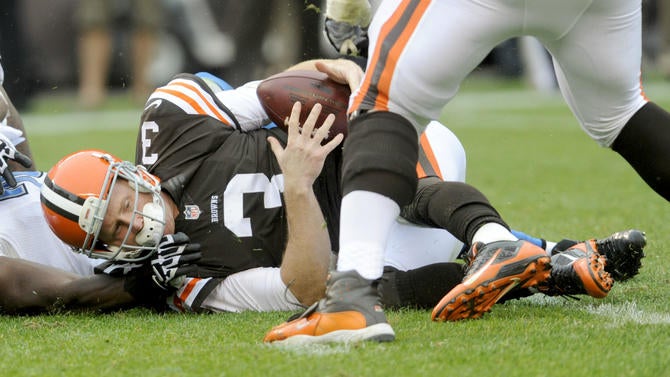
Defensive tackle Phil Taylor made 42 nondescript starts for the Browns and has not played an NFL game since 2014. Receiver Greg Little started 41 games, dropped a ton of balls and hasn't played in the league since 2014. Running back Owen Marecic appeared in six games, totaled 8 yards and retired in 2013. Brandon Weeden started 20 games at quarterback before losing his job in his second season and he hasn't been considered a starter anywhere since 2013. Trent Richardson, drafted after the Browns included Atlanta's first-round pick in 2012 as part of a package to move up and select him, was dealt to the Colts two games into his second season -- amazingly for a first-round pick -- and he hasn't played in the NFL since 2014, either.
"That's the thing about trading picks in the NFL," one AFC evaluator said. "If Cleveland could pick a player and could draft at all, the tables would be turned. But look at how they drafted and all the picks they wasted. They don't have a clue. They lost the trade. Same with the [Robert Griffin III] trade -- if he becomes a franchise quarterback, then Washington would have won.
"In this case Atlanta got a franchise player, a dominant player, and Cleveland had five chances to do that with the picks they got and couldn't find a role player worthy of a second contract. Cleveland can't evaluate players, and they can't evaluate the evaluators to even know if they have anyone who can make the picks."
The 2011 draft was loaded with impact players. Jones was hardly alone, and hardly alone at the receiver spot, as A.J. Green has been a superstar with the Bengals. Besides those two stud receivers, Cam Newton, Von Miller, Patrick Peterson, Tyron Smith, J.J. Watt , Robert Quinn, Mike Pouncey, Ryan Kerrigan, Nate Solder, Cameron Jordan, Jimmy Smith, Mark Ingram, Muhammad Wilkerson and Cameron Heyward have been standouts from that first round. Many of them are the very best in the league at what they do and among the game's highest-paid players. So Dmitroff's odds of hitting on a stalwart were decent even if he stuck at 27 overall (Smith, Ingram, Wilkerson and Heyward went 27th or later).
In the second round in 2011, had Atlanta kept its pick, players like Marcus Gilbert, Randall Cobb and Justin Houston were available and selected within a few selections of where the Browns took Little. In that fourth round things were bleaker -- Bilal Powell, Cortez Allen and Julius Thomas were among the exceptions as contributing players (at least for a while in some cases) taken after where Atlanta would have picked. In the first round in 2012, players like David DeCastro, Dont'a Hightower, Whitney Mercilus, Nick Perry and Harrison Smith were selected after where Atlanta would have picked, while the fourth round of that year -- the last pick going to Cleveland -- was a relative wasteland.
A veteran personnel evaluator offered the following appraisal:
"You trade all those picks for a great receiver, but for how many years did they lose? Thomas [Dimitroff] was on thin ice for a few years there, and you could make the case they may have been in a better situation if they kept those picks and found players to build that defense.
"It depends on how you look at it. People say what a great trade it is, and you can look at it now and Jones is a great player, but for several years it really wasn't a great trade for Atlanta. It took [offensive coordinator] Kyle Shanahan to really get it turned around there, and once he leaves for San Francisco [he is very likely to become the 49ers' next coach], then will we look at it differently? Is it Julio or Kyle who really has that going there? Julio is a great player, but I think it's Kyle."
There is no way to know what could have been had the Falcons kept their picks. But it struck me as I pored over the draft results that the Steelers had selections within a few picks of where the Falcons would have done business had they not shuffled all those picks to the Browns. Pittsburgh, admittedly one of the best drafting teams in the business, turned those selections into Heyward (eventually franchised and a big part of a rebuilt defense), Gilbert, DeCastro (helped turn a subpar offensive line into a true strength) and Allen (received a big contract after emerging as a top corner only to crumble once he got paid). They also traded up in the fourth round in 2012 to take Alameda Ta'amu, a troubled player who quickly washed out.
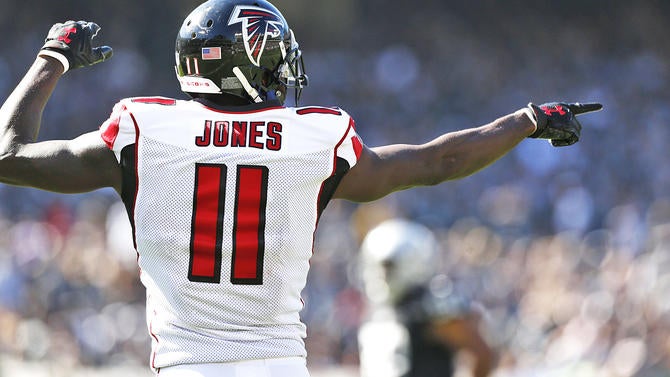
So would you trade those five players for Jones? Would that be a fair trade? What about Heyward, Gilbert, DeCastro and two fourth-round picks for Jones?
"Out of all of that, Thomas got the top franchise player," one personnel man said after I walked him through this exercise. "Thomas has done plenty of stuff that didn't work out, but he went and got the elite player, and that's all you're trying to do with these picks. Would you trade Julio now for those five players, even knowing that three of them are really good? No.
"Now, if Thomas had traded all those picks to Seattle, I doubt we'd be saying Julio was the better part of that trade. We'd be talking about the steal Seattle made. But in this case there is no question Thomas won the trade. Would I do the Julio trade again if I knew that's who I am getting out of it? Yeah, in a heartbeat. Obviously, Thomas made the right decision."
Would the Steelers trade those three top-notch starters for Jones? No, of course not, as they found Brown with the 195th pick in 2010, continuing their exceptional run at finding impact receivers throughout the draft. Regardless, is there more value in the trio of Heyward, Gilbert and DeCastro -- all exceptional grunts who play non-statistical, independent positions -- or in Jones, an outstanding skill player, but one dependent upon a quarterback to get him the ball?
"Boy, that's tough," said another personnel executive who researched many of these principles in the 2011 and 2012 drafts. "Julio Jones or those three players? Oooh, man, I know Pittsburgh wouldn't do that, and I wouldn't do it either. I mean, it depends on the team and what the needs are, but you're talking about two Pro Bowl-type players in Gilbert and Heyward, and one of the best guards in the league with DeCastro. If it's me, I want to build around those three guys in the trenches and take my value from the inside out."
Then the executive paused for a minute, and quickly turned the conversation to where so many others had done the same.
"Thomas really gave up all of that to make that move? ... Dude, the smartest thing he did was target Cleveland," the executive said. "Sometimes it's just as important who you trade with as who you trade for. Cleveland screws everything up."
Indeed, win or lose next Sunday, that's one element of this trade that always will bode in Atlanta's favor. Alas, the Browns traded down again in 2016, to take a receiver, one of a stunning five they selected in the 2016 draft. Meanwhile, Jones is a perennial All-Pro, and, perhaps, a Super Bowl champion as well.







